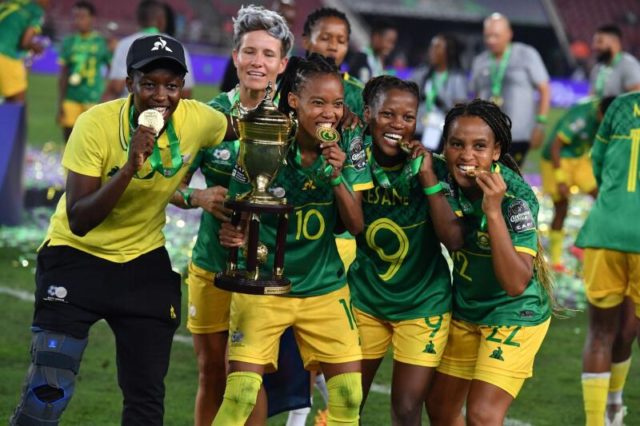Banyana Banyana’s glorious achievement of lifting the Women’s African Cup of Nations crown in Saturday’s final in hostile Morocco highlighted the growth of the game in South Africa, writes Herman Gibbs.
Cape Town – Banyana Banyana’s glorious achievement of lifting the Women’s African Cup of Nations (WAFCON) crown in Saturday’s final in hostile Morocco highlighted the growth of the game in South Africa.
Over the years South Africa’s women’s football learnt many lessons and during that time Banyana Banyana ran up a record on playing in five (WAFCON) without success.
On Saturday night Banyana Banyana had heeded those lessons and produced a polished display to defeat Morocco’s Atlas Lionesses despite long bouts of intimidation in the cauldron of the packed Stade Prince Moulay Abdellah in Rabat.
Banyana Banyana showed that they had done their homework on how to deal with the partisan crowd and their
It was surprising that the Confederation of African Football (CAF) had still not stepped in to ban lasers from live events since the Moroccans had used it all week against opposition teams. It would seem the players were not bothered by lasers shining on their faces.
The matter of crowd intimidation had long been a contentious point and coach Desiree Ellis addressed the subject with the senior players, many of whom felt the title was there for the taking. Their belief was bolstered by back-to-back wins over 11-time WAFCON champions Nigeria in the past year.
Coming into the tournament in Morocco, Banyana Banyana had not been able to secure all the warm-up matches they had counted on. However, it did not unsettle the team and coach Desiree Ellis rode with the punches and ensured players were hard at work in training camps.
In two friendlies this year Banyana Banyana were trounced 5-1 by World No.4 The Netherlands and 3-0 by Zambia in Lusaka but these setbacks merely highlighted the team’s weaknesses which coach Desiree Ellis and her supporting technical team addressed over time.
At the outset of the 2022 showpiece, Banyana Banyana served notice of their intentions with a commanding 2-1 win over 11-time WAFCON champions Nigeria in their opening group match.
Nigeria’s Super Falcons had no answer to Banyana Banyana’s authoritative performance but it came at great cost when their kingpin Thembi Kgatlana came down with an injury that put paid to further participation in Morocco.
It was a major blow for Banyana Banyana to lose the services of the 62-times capped striker who has 22 goals to her credit. For the past two years, she plied her trade at the formidable Spanish side, Atlético Madrid Femenino. It was the second time the team had lost a striker after Gabriela Salgado suffered an injury just before the start of the tournament.
After the Nigerian conquest, Banyana Banyana produced two lethargic displays against Burundi and Botswana to emerge undefeated group winners. They improved somewhat in the knock-out round clashes against Tunisia and Zambia, to reach the final.
Banyana Banyana struck impressive form from the opening whistle in Saturday’s final and held the upper hand in the first half without managing to capitalise.
By the time the game had reached the hour mark it was crying out for a goal and Jermaine Seoposenwe rose like a colossus out wide and left the Moroccan defence floundering in her slipstream. After whipping in a goalmouth cross from the left flank, Hildah Magaia pounced and steered the ball home with clinical precision
The No.8-shirted striker Magaia was in the frame again eight minutes later with a second goal after a sublime touch that would have made the world’s current best No.8 Marcel Desailly of France look on with envy.
The hitherto obstreperous crowd went quiet, and many made their way to the exits but checked their departure when Morocco scored a consolation goal.
Towards the end, the touchline official showed that four minutes of added time would be played. Out of the blue, and with no official explanation, four became nine minutes.
In the end, the extra-extra time did not matter and Morocco became the third WAFCON host to lose a final after South Africa (2000) and Cameroon (2016) suffered the same fate.
@Herman_Gibbs








